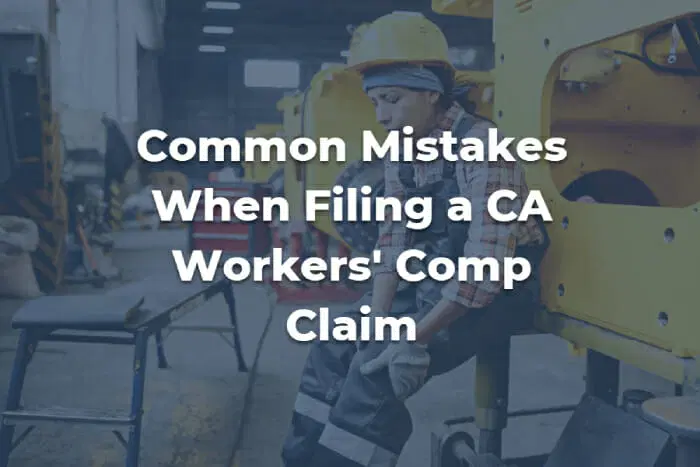
10 Common Mistakes When Filing a California Workers’ Comp Claim
Legally reviewed by: Jessica Anvar Stotz, JD, MBA
As a California State Bar certified attorney referral service, we’ve helped connect many people with experienced attorneys who helped them file successful workers’ compensation claims.
In California, it is generally recommended to report a work-related injury or illness to your employer within 30 days or as soon as possible.
While there is no strict requirement to report the injury within this specific timeframe, delays in reporting can potentially impact the processing of your workers’ compensation claim.
You should inform your employer ASAP to ensure you protect your rights and to get the claims process going as soon as possible.
10 Common Mistakes When Filing Workers’ Compensation Claims
When filing workers’ compensation claims, several common mistakes can potentially hinder the process or affect your desired outcome. Here are ten mistakes to avoid:
- Delaying reporting: Failing to promptly report your work-related injury or illness to your employer can weaken your claim. Notify your employer as soon as possible to avoid any dispute regarding the timeline or cause of the injury.
- Not seeking immediate medical attention: Delaying or avoiding seeking medical treatment can cast doubt on the severity of your injury or illness. It’s crucial to promptly see a healthcare provider, even for seemingly minor injuries, to document the condition and establish a connection to your work.
- Inadequate documentation: Insufficient documentation can weaken your claim. Ensure that you provide accurate and detailed information about the incident, including the date, time, location, witnesses, and a description of how the injury occurred. Keep copies of all relevant medical records, bills, and any communication related to your claim.
- Not adhering to deadlines: Missing important deadlines can jeopardize your claim. California has specific time limits for reporting injuries and filing claims. Familiarize yourself with these deadlines and adhere to them to preserve your rights.
- Not informing healthcare providers about work-related nature: Informing your healthcare providers that your injury or illness is work-related is crucial for accurate documentation. Make sure to mention it during your medical appointments to establish the connection between your condition and your job.
- Lack of consistency: Consistency in your statements, both written and verbal, is vital. Inconsistencies in your descriptions of the incident or your symptoms can raise doubts about the credibility of your claim. Ensure that your statements align with the facts and medical documentation.
- Failing to follow recommended treatment: If you disregard or fail to follow the prescribed medical treatment, it may suggest to the insurance company that your injury is not severe or that you are not committed to recovery. Follow the treatment plan recommended by your healthcare provider and attend all medical appointments.
- Not documenting all symptoms: Be thorough in documenting all the symptoms you experience due to your work-related injury or illness. Sometimes, individuals may only focus on the most apparent symptoms, while other less obvious ones could be equally important for establishing the full impact of the condition.
- Not seeking legal advice: Workers’ compensation laws can be complex, and insurance companies may try to minimize the benefits they provide. Consulting with a workers’ compensation attorney who is well-versed in California law can help you understand your rights, navigate the process, and avoid potential pitfalls.
- Failing to appeal when appropriate: If your claim is denied, it’s important to consider appealing the decision. Many valid claims are initially denied, but they may be successfully resolved through the appeals process. Failing to appeal when you have a legitimate case can result in a loss of benefits you deserve.
Remember, each workers’ compensation claim is unique, and it’s advisable to consult with an attorney specializing in workers’ compensation law to ensure you understand the specific requirements and avoid potential mistakes that could compromise your claim.
Calculate an Estimate of Your Settlement
Not sure if you have a valid workers’ compensation claim? Take this short quiz to gather more information about your case and find out if you need a lawyer or not.
How to File a Workers’ Comp Claim in California
To file a workers’ compensation claim in California, you can follow these general steps:
- Inform your employer: Immediately notify your employer about your work-related injury or illness. It’s important to do this as soon as possible, preferably within 30 days, but it’s recommended to report it immediately. Make sure to provide details of how, when, and where the injury occurred.
- Seek medical treatment: If you require immediate medical attention, seek appropriate medical care right away. Your employer may have a designated medical provider, so check with them for specific instructions. Otherwise, you can choose your own medical provider from the Medical Provider Network (MPN) established by your employer’s workers’ compensation insurance carrier.
- Complete the claim form: Obtain a claim form from your employer or their workers’ compensation insurance carrier. In California, the commonly used form is the DWC-1 claim form. Complete the form accurately and provide all the necessary information regarding your injury or illness.
- Submit the claim form: Once you have filled out the claim form, make copies for your records and submit the original form to your employer. Keep a copy of the form and any other related documents you submit.
- Employer’s obligations: Your employer is responsible for reporting your injury or illness to their workers’ compensation insurance carrier. They must provide you with a copy of the completed claim form, known as the “Notice of Potential Eligibility,” within one working day of receiving your claim.
- Insurance company review: The workers’ compensation insurance carrier will review your claim and investigate the circumstances surrounding your injury or illness. They may request additional information or medical documentation from you or your healthcare provider.
- Decision on your claim: The insurance company has 90 days from the date your claim form is received to either accept or deny your claim. If your claim is accepted, you should start receiving appropriate benefits. If it’s denied, you have the right to appeal the decision.
- Appeals process: If your claim is denied, you can file an appeal with the California Workers’ Compensation Appeals Board (WCAB). The WCAB is an administrative court system that handles disputes related to workers’ compensation. It’s recommended to seek legal representation or advice from a workers’ compensation attorney during the appeals process.
Remember that this is a general overview of the process, and there may be specific variations or additional steps based on your situation. It’s advisable to consult with a workers’ compensation attorney who specializes in California law to ensure you understand and protect your rights throughout the process.
What Happens After Your Claim is Filed?
After a workers’ compensation claim is filed, several steps typically follow. Here is a general overview of what usually happens:
- Claim acknowledgment: Once your claim is submitted, the workers’ compensation insurance carrier will acknowledge receipt of the claim. They will provide you with a copy of the completed claim form, known as the “Notice of Potential Eligibility,” within one working day.
- Investigation and review: The insurance carrier will review your claim and investigate the circumstances surrounding your injury or illness. They may gather additional information, such as medical records, witness statements, or documentation from your employer.
- Medical evaluation: The insurance company may require you to undergo a medical evaluation by a qualified healthcare provider. The purpose of this evaluation is to assess the extent of your injury or illness, determine the need for treatment, and evaluate your ability to return to work.
- Benefit determination: Based on the information gathered during the investigation and medical evaluation, the insurance company will make a decision regarding the acceptance or denial of your claim. They have 90 days from the date your claim form is received to make this determination.
- Notification of decision: Once the insurance company reaches a decision, they will notify you in writing. If your claim is accepted, you will start receiving appropriate benefits. If your claim is denied, the denial letter should outline the reasons for the denial.
- Dispute resolution or appeals: If your claim is denied, you have the right to dispute the decision. In California, this typically involves filing an appeal with the California Workers’ Compensation Appeals Board (WCAB). The appeals process allows for a formal review of your claim and may involve a hearing or mediation to resolve the dispute.
- Benefit payments and treatment: If your claim is accepted, you should begin receiving workers’ compensation benefits, such as medical treatment coverage, wage replacement benefits, and vocational rehabilitation if necessary. The duration and type of benefits will depend on the nature and severity of your injury or illness.
It’s important to note the specific details, steps and timelines can vary with each individual case. One of the best ways to know what direction your case will go is to hire a workers’ comp attorney.
Get Help with Your Claim
If you are struggling with a current claim or don’t know where to start, LawLinq can help connect you with some of the best work comp attorneys in the state. We’ve created relationships with top rated attorneys for years to help people receive the compensation they deserve after an injury.
Our service is free to use and we’re here to answer your call 24/7. Don’t get stuck waiting for a call back from an attorney you’re unsure about.
Additional CA Workers’ Compensation Articles
- Best Los Angeles Workers’ Compensation Lawyers
- California Workers’ Compensation Settlement Chart
- How Much Do Workers’ Compensation Lawyers Charge in CA?
- Does Surgery Increase Workers’ Comp in California?


